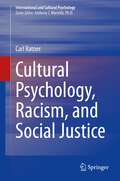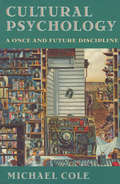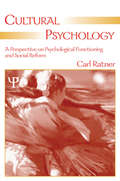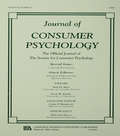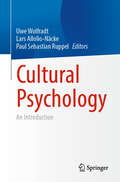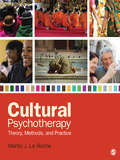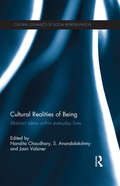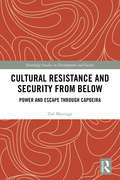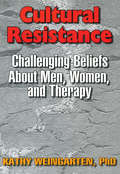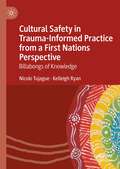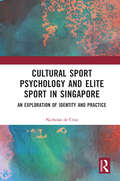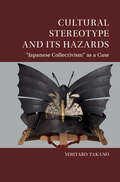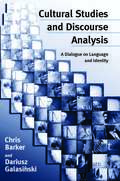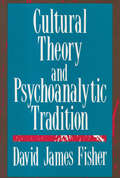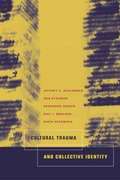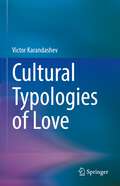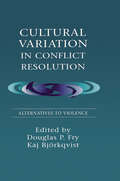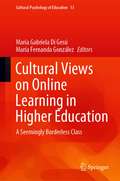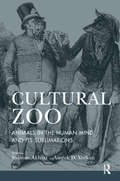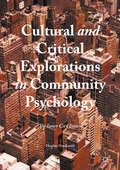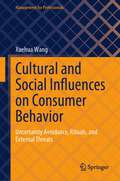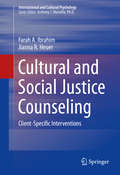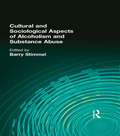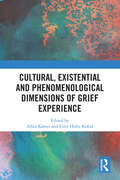- Table View
- List View
Cultural Psychology, Racism, and Social Justice (International and Cultural Psychology)
by Carl RatnerThis book utilizes cultural psychology as a cultural theory and psychological theory capable of explaining and improving social issues. In particular Vygotsky’s cultural-historical psychology, and Ratner’s macro-cultural psychology are invoked to explain racism and mitigate it. This explanation of, and solution to, racism are utilized as a framework for analyzing and refining contemporary movements for racial justice. Among the topics discussed:Macro cultural psychology and Vygotsky’s Marxist cultural-historical psychologyDifferentiating psychological racism from economic racismHistorical examples of racism during American slavery which reveal their cultural and psychological featuresCultural-psychological analysis and refinement of Black Lives Matter, racial capitalism, intersectionism, and Ta-Nehishi Coates’ work Cultural Psychology, Racism, and Social Justice will be of interest to the fields of social policy, social transformation, psychological theory, cultural theory, and history.
Cultural Psychology: A Once and Future Discipline
by Michael ColeThe distinguished psychologist Michael Cole, known for his pioneering work in literacy, cognition, and human development, offers a multifaceted account of what cultural psychology is, what it has been, and what it can be. A rare synthesis of the theory and empirical work shaping the field, this book will become a major foundation for the emerging discipline.
Cultural Psychology: A Perspective on Psychological Functioning and Social Reform (Path In Psychology Ser.)
by Carl RatnerCarl Ratner's new book deepens our understanding of psychology by emphasizing the role that cultural factors, such as social institutions, artifacts, and cultural concepts play in psychological functioning. The author demonstrates the impact of culture on stimulating and structuring emotion, personality, perception, cognition, memory, sexuality, and mental illness. Examples from interdisciplinary social science research illuminate a sophisticated dialectical relationship between cultural factors and psychological phenomena. Written in an engaging style, the book articulates a new theory, "macro cultural psychology", and a qualitative methodology for investigating the cultural origins, characteristics, and functions of psychological phenomena. Ratner explains how this cultural perspective can be used to enhance psychological growth, illuminate directions for social reform, and how social reform can enhance psychological functioning, and vice versa. Cultural Psychology critically examines several prominent psychological approaches including social constructionism, feminism, hermeneutics, psychobiology, evolutionary, cross-cultural, ecological, and mainstream psychology. The book articulates a theory of macro culture that emphasizes the political dimension of culture and psychology. Intended for students, researchers, and practitioners in psychology, education, psychotherapy, history, sociology, anthropology, linguistics, philosophy, and policy makers and practitioners in public health and social service who are interested in understanding cultural aspects of psychology. The book is an appropriate text for courses in cross-cultural or community psychology, social work, social theory, and critical thinking.
Cultural Psychology: A Special Issue of the journal of Consumer Psychology
by Paul M. Herr Frank R. KardesFirst published in 2000. Routledge is an imprint of Taylor & Francis, an informa company.
Cultural Psychology: An Introduction
by Uwe Wolfradt Lars Allolio-Näcke Paul Sebastian RuppelThe introductory book presents the current state of cultural psychology in terms of theoretical approaches and methods comprehensively. It also demonstrates how deeply it is anchored in various fields of action. Cultural psychology is an interdisciplinary field of research that aims less to objectively and causally explain human behavior and experience, but rather seeks to understand psychological phenomena in their respective sociocultural context. In doing so, it follows a theoretical understanding of humans as actively acting beings. Compared to the prevailing nomothetic-oriented psychology, it emphasizes different theoretical and methodological approaches, particularly highlighting intentionality, meaning structuring, and ultimately the cultural aspects of human existence. Cultural psychology incorporates both hermeneutic approaches from psychology, philosophy, sociology, and ethnology, as well as qualitative methods for studying human behavior and experience.
Cultural Psychotherapy: Theory, Methods, and Practice
by Martin J. La RocheWritten by a leading expert in the field of culturally competent psychotherapeutic practice, this book presents an integrated psychotherapeutic framework designed to help students and practitioners understand, investigate and treat clients from diverse cultural backgrounds (including all races and backgrounds). La Roche introduces a logical theoretical model that takes into account the influence of sociopolitical, economic and cultural processes (e.g., discrimination, cultural oppression, economic inequities) within the psychotherapeutic process. In addition to highlighting socio-cultural forces, La Roche focuses on and emphasizes the psychotherapeutic relationship and the client′s unique history and experiences. Using a three-phased psychotherapeutic model with specific clinical recommendations and suggestions for each phase, the book explores complex clinical cases that illustrate in detail each phase.Unique in its approach to and definition of the concept of cultural diversity, Cultural Psychotherapy expands the traditional ethnicity/race model to a model that examines individuals and groups according to a broader set of variables (e.g., ethnic identity, self-orientation, gender orientation, and socioeconomic class). In other words, the key to enhancing our understanding of our clients is to take into account the rich and dynamic context in which their lives develop and evolve.
Cultural Realities of Being: Abstract ideas within everyday lives (Cultural Dynamics of Social Representation)
by Nandita Chaudhary Jaan Valsiner S. AnandalakshmyCultural Realities of Being offers a dialogue between academic activity and everyday lives by providing an interface between several perspectives on human conduct. Very often, academic pursuits are arcane and obscure for ordinary people, this book will attempt to disentangle these dialogues, lifting everyday discourse and providing a forum for advancing discussion and dialogue. Nandita Chaudhary, S. Anandalakshmy and Jaan Valsiner bring together contributors from the field of cultural psychology to consider how people living within social groups, regardless of how liberal, are guided by collective reality and interconnected with life circumstances. The book discusses experiences and events in the lives of people of Indian cultures covering topics including family, food, pilgrimages, social dynamics and truth, in order to expand the material on human phenomena under the broad frame of cultural psychology. The book builds upon rich cultural traditions present in India, and precisely because of this focus, the book has much larger implications and relevance to the field and aims to orient the academic reader from around the world to viewing India and Indian society as a valuable area for research. Divided into three sections, the book covers:• Social presentation in culture• Representing relations• Children and youth in cultureThis book includes commentaries from expert academics from outside of India, providing a bridge between academic reality and cultural discourse and throwing fresh light on the everyday events presented in the text. Cultural Realities of Being will be essential reading for those studying Cross Cultural Psychology as well as those interested in social representation and identity.
Cultural Resistance and Security from Below: Power and Escape through Capoeira (Routledge Studies in Development and Society)
by Zoë MarriageThis book uses the Afro-Brazilian art of capoeira to examine how security has been pursued from below and what significance this has for security analysis and policy. Illegal at the beginning of the twentieth century, capoeira is now a cultural institution and export that is protected by the Brazilian state and recognised by UNESCO, with capoeira players protecting and promoting their interests through the practice and development of their art. The book brings the musical and corporeal narrative from capoeira into conversation with debates on security; these have typically been dominated by northern, white, military voices, and as a result, the perspective of the weaker player is routinely overlooked in security literature and policy making. Bringing the perspective of the weaker party, Cultural Resistance and Security from Below examines the distribution of security from two angles. First, it presents the history of the interaction between capoeira players and the Brazilian society and state that resulted in political and legal acceptance of capoeira. Second, it explores how the practice of capoeira generates knowledge of identities, explanations and values, and how this knowledge empowers communities of players and is communicated to society more broadly. The book then turns to consider how capoeira resists within Brazil's contemporary context of insecurity, and what significance the knowledge and power, along with capoeira's core move of escape, have to security analysis and policy. The book concludes by taking the lessons from capoeira to inform understanding of other cultural activities and ways of life as potential sites and forms of resistance. Conceptually and methodologically original, this book will be of interest to scholars and students in the fields of security studies, development studies, political science and international studies. It will also be of interest to those scholars interested in the changing interaction between politics and the arts.
Cultural Resistance: Challenging Beliefs About Men, Women, and Therapy
by Kaethe WeingartenIn everyday life--in relationships, in various institutions, in texts--cultural premises influence and sometimes limit individuals’thoughts, actions, and ideas. Cultural Resistance: Challenging Beliefs About Men, Women, and Therapy analyzes cultural constraints and encourages therapists, individuals, and communities to practice cultural resistance on a daily basis, allowing for the realization of diverse and suppressed knowledges. Cultural Resistance shows general patterns by which some ideas in a culture become accepted and others are marginalized. It proposes ways individuals and communities can resist the hold of limiting ideas on their lives. In the postmodern tradition, Editor Kathy Weingarten brings together authors who ask and offer answers to the question, “What is not present in our thinking?” Each chapter invites therapists to extend their thinking about the scope of their work. Topics covered include: challenging cultural beliefs about mothers transforming masculine identities lesbian and gay parents a narrative approach to anorexia/bulimia perspectives on the Black woman and sexual trauma, focusing on Thomas v. Hill opening therapy to conversations with a personal god new conversations on controversial issuesThe chapters in Cultural Resistance first describe cultural premises that constrain the lives of women, men, and/or therapists and then develop an approach to resisting these constraints. A response follows each chapter in an effort to promote discourse, extend meanings, and encourage learning between professionals.Cultural Resistance yields new perspectives on the nature of social change and the relationships between individuals and culture. It offers valuable insights to family therapists, psychiatrists, psychologists, and social workers who want to broaden their thinking and approach. It gives therapists a fresh, new way of thinking about themselves, others, and their conversations through applications which may be professional, personal, or both.
Cultural Safety in Trauma-Informed Practice from a First Nations Perspective: Billabongs of Knowledge
by Nicole Tujague Kelleigh RyanThis book provides an accessible resource for conducting culturally safe and trauma-informed practice with First Nations’ peoples in Australia. Designed by and for Australian Indigenous peoples, it explores psychological trauma and healing, and the clinical and cultural implications of the impacts of colonization, through an Indigenous lens. It is a companion for anyone who works or will work with our families and communities. The authors recognise trauma at the heart of all Indigenous disadvantage, and explore types of trauma in the context of Indigenous, collective cultures. The chapters take an Indigenous ‘Yarning’ approach to sharing knowledge, and encourage readers to challenge their unconscious, long-held beliefs and worldviews. Nicole Tujague and Kelleigh Ryan identify the differences between mainstream systems and more holistic Indigenous understandings of social and emotional health and wellbeing and outline a meaningful practice framework for practitioners. They analyse types of complex trauma, including intergenerational, institutional, collective and historical trauma; and discuss the impacts of racism and the concept of ‘cultural load’. They also address vicarious, or “compassion” trauma experienced by front line workers and carers; and offer insights into their experience of working with collective healing programs.This book is essential reading for Indigenous practitioners and service providers to Aboriginal and Torres Strait Islander people. It is also a valuable resource for students likely to work with First Nations’ peoples within a broad range of health and social science disciplines.
Cultural Sport Psychology and Elite Sport in Singapore: An Exploration of Identity and Practice
by Nicholas de CruzGuided by the principles of cultural sport psychology (CSP), this book explores the psychosocial issues surrounding elite sport and psychological practice in Singapore. CSP recognises the importance of understanding people as individuals, rather than objectifying and interpreting psychological processes independent of the socio-cultural context in which they stem from. For sport psychology to progress, it is imperative to distinguish and appreciate the difference between treating someone the same (i.e., culturally blind approach) and treating them equally (i.e., possess cultural awareness). To address the paucity of cultural-specific research, this book explores the psychosocial issues of elite sport in Singapore using CSP as a theoretical and guiding philosophy. Given Singapore’s recent successes at the Olympic and Paralympic levels, this book is ideally timed to investigate the social and cultural developments of elite sport as they occur in a specific sociocultural context. The authors argue that if elite sport and sport psychology is to progress in Singapore, there is a need to refine its elite ecosystem, regulate the practice of sport psychology, and work towards establishing a professional community centred around a culture of constructive exchange, debate and cooperation. This book presents a blueprint to any researcher, national institute, or practitioner, to systematically explore the culture and context within which they operate and organise action plans to address unique needs that were identified through this process.
Cultural Stereotype and Its Hazards: ‘Japanese Collectivism' as a Case (Culture and Psychology)
by Yohtaro TakanoAlthough it is widely believed that Japanese people are typical collectivists compared to individualistic Westerners, this view is not supported by empirical research. Employing 'Japanese collectivism' as a case example, this book explores how the dichotomous view of cultures was established and investigates how cultural stereotypes exacerbate emotional conflicts between human groups. Drawing on empirical findings, it theoretically analyses the properties of cultural stereotype to reveal the hazards associated with stereotyping nations or ethnicities. Students and researchers from numerous disciplines, including psychology, anthropology, sociology, political science, and economics, will gain fresh insights from this reconceptualization of culture.
Cultural Studies and Discourse Analysis: A Dialogue on Language and Identity (Cultural Studies)
by Chris Barker Dariusz Galasi SkiThis novel and important book brings together insights from cultural studies and critical discourse analysis to examine the fruitful links between the two. Cultural Studies and Discourse Analysis shows that critical discourse analysis is able to provide the analytic context, skills and tools by which we can study how language constructs, constitutes and shapes the social world and demonstrates in detail how the methodological approach of critical discourse analysis can enhance cultural studies. In a richly argued discussion, the authors show how marrying the methodology of critical discourse analysis with cultural studies enlarges our understanding of gender and ethnicity.
Cultural Theory and Psychoanalytic Tradition
by David FisherThe culture of psychoanalysis has many traditions and multiple schools of theory and thought. This work presents informative and original investigations into three overlapping areas of psychoanalytic tradition: the history of psychoanalysis; psychoanalytic culture criticism; and the application of psychoanalytic methods to the study of history. In this carefully crafted evaluation of various authors and subjects, Fisher's perceptions are informed by a deep and comprehensive knowledge of the psychoanalytic movement, its interaction with the wider context of European cultural and political history, and its philosophical and clinical origins. In examining the history of the movement, Fisher attempts to discover the fundamental inspiration of psychoanalysis by returning to the origins of the discipline. Freud is the central figure here, but Fisher also looks to the second generation of European analysts, including such maverick figures as Lacan and Spielrein, and mainstream figures as Fenichel to gain insight into the multidimensional and creative personalities who were drawn to Freud and his ideas. In his discussion of psychoanalytic culture criticism, Fisher analyzes symbolic meanings and psychological themes from a variety of written works. In an analysis of Freud's Civilization audits Discontents, the author argues that the figure of Romain Rolland is pervasive throughout the text as symbol, muse, stimulus, and adversary. Reading analytic theory and applying it to personalities and situations from the past allowed historians to address issues of their own inner world and to develop breathtaking possibilities for understanding the past. Brilliantly written and historical and critical in method, Cultural Theory and Psychoanalytic Tradition offers valuable insights into significant themes and ambiguities in the diverse areas of psychoanalysis. Intellectual historians and psychoanalysts will find reliable introductions and springboards f
Cultural Trauma and Collective Identity
by Neil J. Smelser Jeffrey C. Alexander Ron Eyerman Bernard Giesen Piotr SztompkaIn this collaboratively authored work, five distinguished sociologists develop an ambitious theoretical model of "cultural trauma"--and on this basis build a new understanding of how social groups interact with emotion to create new and binding understandings of social responsibility. Looking at the "meaning making process" as an open-ended social dialogue in which strikingly different social narratives vie for influence, they outline a strongly constructivist approach to trauma and apply this theoretical model in a series of extensive case studies, including the Nazi Holocaust, slavery in the United States, and September 11, 2001.
Cultural Typologies of Love
by Victor KarandashevThis timely volume offers an integrative approach and a culturally diverse view of love conceptions, experiences, and expressions, building on both individual and cultural typologies of love. It comprehensively presents cultural and cross-cultural studies on how culture affects love, and offers a systematic description of types and cultural models of love. The comprehensive reviews of methodology and findings provide a solid empirical basis for the creation of formal typologies. This book will be useful for researchers interested in cross-cultural studies of love across many disciplines. Its accessible language also makes it ideal for undergraduate and graduate students. Readers will gain a comprehensive understanding of: Cultural conceptions of love and methods for their research Multiple perspectives in the studies of love across world cultures Cultural models and typologies in an international perspectiveCultural models and typologies from an interdisciplinary scientific perspective
Cultural Variation in Conflict Resolution: Alternatives To Violence
by Douglas P. Fry Kaj BjörkqvistThis volume's central purpose is to provide a clearly written, scholarly exploration of cultural variation regarding conflict resolution and in so doing, highlight certain alternatives to violence. It presents an interdisciplinary examination of how conflicts are perceived and handled in a variety of cultural settings. Drawing on data and models from anthropology, psychology, and political science, the chapters analyze conflict resolution across the societal spectrum, including cases from Western and non-Western traditions, complex and tribal societies, and violent and non-violent cultures. While demonstrating the extremely important impact of culture on conflict resolution processes, the book does not solely emphasize cultural specificity. Rather--through introductory chapters, section introductions, and a concluding chapter--the volume editors draw attention to cross-cultural patterns in an attempt to further the search for more general conflict principles. An explicit message throughout the book is that alternatives to violence exist. The volume demonstrates that at various levels--from the interpersonal to the international-- conflicts can be handled in ways that cause far less pain and destruction than violence. Chapters by psychologists discuss social and cognitive processes for facilitating the learning of alternatives to violence among children and youth. Anthropology contributors explore mechanisms for dealing with social conflict which allow some cultures to remain relatively peaceful and consider implications of their work for reducing violence in other societies. Chapters by former President of Costa Rica, Oscar Arias, and by political scientists examine how non-violent political solutions can be employed as alternatives to warfare and violent resistence.
Cultural Views on Online Learning in Higher Education: A Seemingly Borderless Class (Cultural Psychology of Education #13)
by María Fernanda González María Gabriela Di GesúThis book opens up a fruitful conversation by and between invited academics from Europe and Latin America on the features of online learning in higher education. The authors analyse online education from interdisciplinary theoretical and empirical reflections to reveal the existing tensions and turning this book into a valuable artifact on how learning is shaped when technology comes in-between diverse geographical and social contexts. Like any other human activity, e-learning can be seen as a context-dependent educational system with many objects in mutual interaction. Applying a cultural psychology perspective to this provides new answers to questions such as: How can cultural psychology shed new light on online learning? Why do students and academics still opt for classic classes? What inner boundaries are pushed when studying online? How can online learning be influenced by affect? How do teachers and students mold their identities when they move in and out of online environments? This book reveals the existing tensions, resistances and appropriation strategies that students and academics from diverse backgrounds and places go through when attending online learning courses in higher education and furthermore shows how these theoretical frameworks can be successfully applied to practice.
Cultural Zoo: Animals in the Human Mind and its Sublimation
by Salman Akhtar Vamik D. VolkanThis book traces the historical and cross-cultural aspects of the psychic bond between man and animals, and elucidates the role of animals in the normal development of the human mind. It discusses the phenomenology and dynamics of the appearance of animals in human dreams.
Cultural and Contextual Perspectives on Developmental Risk and Well-Being
by Jacob A. Burack Louis A. SchmidtDevelopmental risk refers to conditions, characteristics, experiences, or situations with potentially deleterious effects that lead to outcomes later in life that do not meet societal expectations. While risk is typically framed as the statistical probability of a problematic outcome in relation to the general population, the converse notion of well-being is considered in relation to the level of functioning at a given developmental stage. The contributors to this volume provide insight into developmental well-being by examining the ways that culture and context affect outcomes associated with various types of risk, such as those related to oppression, academic performance, family background, life history, physical health, and psychiatric conditions. Even though certain outcomes may seem inevitable in cases involving harmful environments, diseases, and disorders, they are virtually all influenced by complex interactions among individuals, their families, communities, and societies.
Cultural and Critical Explorations in Community Psychology: The Inner City Intern
by Heather MacdonaldThis book engages the practice of community-based psychology through a critical lens in order in order to demonstrate that clinical practice and psychological assessment in particular, require more affirmative psychopolitical agency in the face of racial injustice within the urban environment. Macdonald includes examples of clinical case analyses, vignettes and ethnographic descriptions while also drawing upon a cross-fertilization of theoretical ideas and disciplines. An oft neglected element of community psychology is the practice of community informed psychological assessment, especially within the inner city environments. This book uniquely suggests ideas for how clinical practice, in relationship to issues such as race and cultural memory can serve as a substantial vehicle for social justice against the backdrop of a prejudiced criminal justice system and mental health delivery system.
Cultural and Social Influences on Consumer Behavior: Uncertainty Avoidance, Rituals, and External Threats (Management for Professionals)
by Xuehua WangThis book explores how cultural and social influences affect consumer decision making with a focus on uncertainty avoidance, rituals, and external threats. Indeed, uncertainty avoidance can exert significant influence on consumer behavior. For example, consumers in a culture with high uncertainty avoidance may show less positive attitudes towards new products than those in a culture with low uncertainty avoidance. Prior cultural research has mainly focused on how individualism/collectivism or power distance belief influences consumer attitudes and behaviors at an individual level, while seldom does research investigate the effect of uncertainty avoidance on consumption. This book examines how uncertainty avoidance affects superstitious consumption as well as its underlying mechanism and boundary condition. Rituals, as a component of culture, can affect consumer behaviors. However, few studies have shedded light on how repeating rituals can affect consumers’ willingness to use the products involved in the ritual. Consumer behavior is complex. Consumers are surrounded with various external threats such as health, economic, and informational threats, while prior research has primarily focused on health threats. Beyond this, inter-client conflicts, as a special type of social threat, can also affect consumption experience. In all, this book aims to examine how uncertainty avoidance, rituals and external threats influence consumer attitudes and behaviors. In this book, new research models would be developed. This book enriches our understanding on how cultural and social influences affect consumer decision making and provides insights for both researchers and practitioners in marketing.
Cultural and Social Justice Counseling: Client-Specific Interventions (International and Cultural Psychology)
by Farah A. Ibrahim Jianna R. HeuerThis timely volume gives readers a robust framework and innovative tools for incorporating clients' unique cultural variables in counseling and therapy. Its chapters identify cultural, societal, and worldview-based contexts for understanding clients, from the relatively familiar (ethnicity, gender, age) to the less explored (migration status, social privilege, geographic environment). Diverse cases illustrate how cultural assessments contribute to building the therapeutic relationship and developing interventions that respect client individuality as well as group identity. In these pages, clinicians are offered effective strategies for conducting more relevant and meaningful therapy, resulting in better outcomes for client populations that have traditionally been marginalized and underserved. The appendices include the Scale to Assess Worldview© (Ibrahim & Kahn, 1984), The Acculturation Index© (Ibrahim, 2008), and the Cultural Identity Check List-Revised© (Ibrahim, 2007). Among the topics covered: Cultural identity: components and assessment. Worldview: implications for culturally responsive and ethical practice. Understanding acculturation and its use in counseling and psychotherapy. Social justice variables critical for conducting counseling and psychotherapy. Immigrants: identity development and counseling issues. Designing interventions using the social justice and cultural responsiveness model. Cultural and Social Justice Counseling is a profound source of knowledge for clinicians and students in mental health fields (counselors, psychologists, psychiatrists, psychiatric nurses, social workers) who are working with clients from diverse cultural backgrounds, including those working in international settings, with clients across cultures, and with sojourners to the US.
Cultural and Sociological Aspects of Alcoholism and Substance Abuse
by Barry StimmelIn this highly informative book on the sociocultural interactions between alcoholism and drug abuse, experts explore the relationship of such factors as ethnicity, family, religion, and gender to chemical abuse and address important implications for treatment.
Cultural, Existential and Phenomenological Dimensions of Grief Experience
by Allan Køster Ester Holte KofodThis innovative volume examines the phenomenological, existential and cultural dimensions of grief experiences. It draws on perspectives from philosophy, psychology and sociocultural studies to focus on the experiential dimension of grief, moving beyond understanding from a purely mental health and psychiatry perspective. The book considers individual, shared and collective experiences of loss. Chapters explore the intersections between the profound existential experiences of bereavement and how this is mediated by sociocultural norms and practices. It points to new directions for the future conceptualization and study of grief, particularly in the experiential dimension. Drawing on a range of interdisciplinary perspectives, this important book will appeal to academics, researchers and students in the fields of death and bereavement studies, wellbeing and mental health, philosophy and phenomenological studies.
